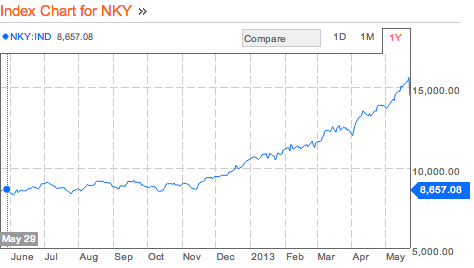Japan's Nikkei plummets amid volatile sentiment


The Nikkei index took a nosedive overnight, falling 7.3 percent over investor sentiment about the Bank of Japan's policies. This is unwelcome news for Prime Minister Shinzo Abe whose aggressive Keynesian policies are finally reversing two decades of stagnation through economic growth, rising stock prices, and falling Yen.
Last night's micro-crash was sparked by a sudden 1 percent rise in 10-year Japanese government bond yields, unexpectedly weak reporting on Chinese manufacturing, and U.S. monetary news. The Japanese government's gross public debt is nearly 230 percent of GDP (this can be attributed to deficits spurred on by demographic and deflation issues). The 10-year bond yield spike raised investor concerns that Japan is vulnerable to servicing its debt.
Prime Minster Abe has attempted to stimulate the economy to reduce deficits. Nobel Laureate Dr. Paul Krugman said that Abe's policies were "an attempt, finally, to do what should have been done long ago: combine temporary fiscal stimulus with a real effort to move inflation up." Inflation has helped to raise exports.
The effect of "Abenomics" has caused the Nikkei boom over the past six months and made Japanese stocks very attractive to the global financial industry. The market remains far ahead of where it was a year ago, but the psychology of debt and fears of a weakening global economy were enough to precipitate a major sell off.
(image credit: Bloomberg.com)
This post was originally published on Smartplanet.com